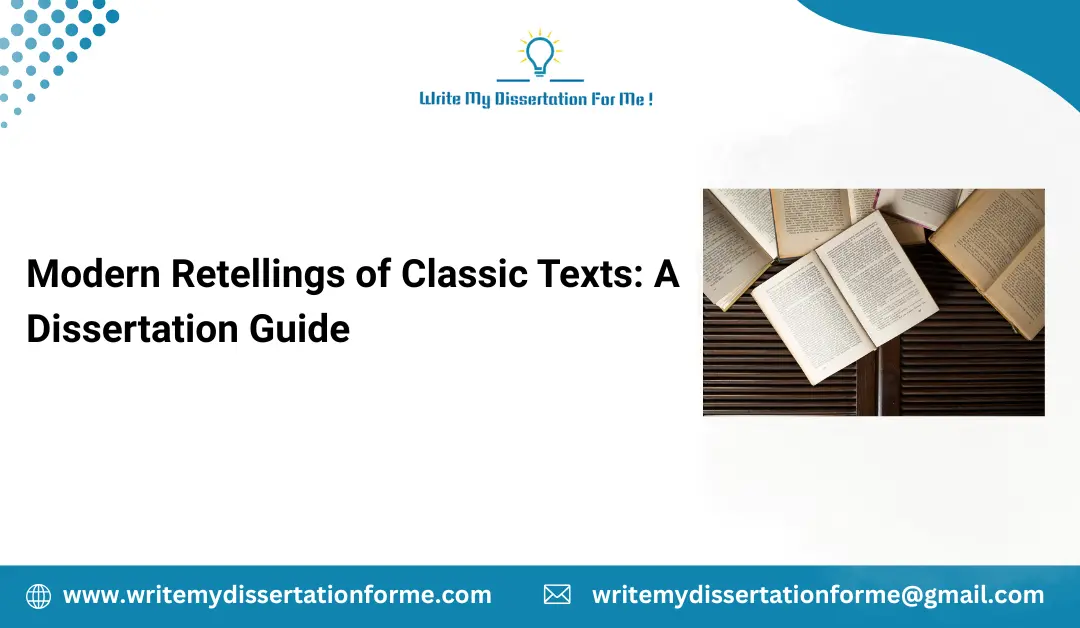Modern Retellings of Classic Texts: A Dissertation Guide
May 02 2025 | 04 min read

Classic literature has influenced cultures, ideologies, and literary movements for millennia. These immortal works, like Homer's Iliad and Shakespeare's Hamlet, continue to inspire new generations of readers and academics. But how do these stories stay relevant today? The solution lies in modern retellings, an inventive literary movement in which ancient stories are recreated through current glasses.
If you're a student working on your dissertation and have a passion for literature, researching modern retellings of classic works can be an intriguing and intellectually rich topic. In this guide, we'll lead you through the process of writing a dissertation on this topic, from topic selection to final submission, and explain how to tackle such a vibrant and innovative field of study. Why Choose Modern Retellings for Your Dissertation?
Why Use Modern Retellings for Your Dissertation?
Classic works are frequently researched for their historical and literary value. However, retelling these stories creates fresh opportunities for interpretation, critique, and analysis. Modern retellings enable scholars to:
- Investigate how authors change themes, characters, and stories for different cultural contexts.
- Investigate the sociopolitical criticism embedded in the redesigned versions.
- Compare original with current writings to discover shifts in values, ideologies, and storytelling approaches.
Such a dissertation exhibits critical thinking, intertextual analysis, and cultural understanding, all of which are highly prized in academia.
Why Choose Modern Retellings for Your Dissertation?
Classic works are extensively studied because of their historical and literary significance. However, recounting these stories provides new opportunity for interpretation, critique, and analysis. Modern retellings allow scholars to
- Investigate how authors adapt themes, characters, and stories to different cultural contexts.
- Examine the sociopolitical criticism embedded in the altered versions.
- Compare the original and current writings to identify shifts in beliefs, philosophies, and storytelling styles.
Such a dissertation demonstrates critical thinking, intertextual analysis, and cultural comprehension, all of which are valued in academia.
Step 1: Develop a Research Question:
Your research question should be specific, debatable, and unique. Here are a few sample questions:
- How do modern retellings question the gender roles imposed by classic texts?
- How do current retellings reflect postcolonial or feminist critiques of the original narrative?
- What literary devices do modern adaptations employ to recast historical circumstances for today's audiences?
A well-defined question establishes the tone for your entire dissertation and keeps your work on track.
Step 2: Literary Theories and Frameworks:
Including literary theory in your dissertation will enhance your analysis. Some applicable frameworks are:
- Feminist Theory: Investigate how female characters are given more agency.
- Postcolonial Theory: Investigate retellings about imperialism or cultural identity.
- Queer Theory: Investigate reinterpretations that incorporate LGBTQ+ views.
- Narratology: Examine how the narrative structure and voice differ between the original and retelling.
These theories not only provide complexity to your writing, but also demonstrate your critical thinking abilities.
Step 3: Methodology and Research:
A dissertation is more than merely interpretation; it requires rigorous academic technique. Here's how you can organize your research.
- Textual Analysis: Read the original and modern texts closely.
- Contextual Research: Investigate the historical, cultural, and social underpinnings of both versions.
- Secondary Sources: Use scholarly publications, journals, and critical essays to back up your arguments.
You may be wondering, "This is overwhelming—can someone write my dissertation for me?" While it is totally normal to feel overwhelmed, remember that getting expert help does not imply giving up. If you're stuck or short on time, it's a good idea to pay someone to write your dissertation for you or at least help with particular portions, such as literature reviews or editing.
Step 4: Comparative Analysis:
The contrast is crucial to your dissertation. Examine:
- Themes: How are themes like love, power, identity, and revenge perceived differently?
- Characterization: How are characters modernized or changed?
- Setting and context: How does changing the setting affect the narrative?
- Moral and ethical dimensions: What new dilemmas or ideals are presented?
Your analysis should use obvious similarities and contrasts to demonstrate how current retellings respond to, critique, or change the original content.
Step 5: Structure the Dissertation:
A standard structure could look like this:
- Introduction: Introduce the topic, motivation, and research question.
- Literature Review: Discuss current scholarly research on the original and recounted texts.
- Theoretical Framework: Present the literary theories you intend to apply.
- Methodology: Explain your research methodology and approach.
- Textual Analysis: Provide detailed analysis and comparisons of the texts.
- Discussion: Interpret your findings and apply them to larger literary patterns.
- Conclusion: Summarize your findings and recommend areas for future research.
If you are still struggling and asking, Can someone write my dissertation for me? then the answer is yes. There are various reliable dissertation writing firms that provide personalized academic support. Simply guarantee that you work with reliable sources who deliver original, plagiarism-free articles.
Step 6: Common Pitfalls to Avoid:
Here are some common blunders students make when working on this subject:
- Avoid making broad generalizations and instead focus on literary methods and cultural critiques.
- Ignoring Context: Don't evaluate texts in isolation; context counts.
- Poor Time Management: Allow sufficient time for modifications, adviser comments, and unforeseen delays.
Ethical considerations:
While it is OK to seek assistance or pay professionals for editing and advice, keep in mind that your dissertation should reflect your comprehension and effort. If you're thinking about utilizing a writing service, make sure to participate actively and use the content as a learning tool.
Many students Google Can someone write my dissertation for me? in a panic. However, the preferred method is to get ethical academic assistance that allows you to meet deadlines while maintaining honesty.
Final Thoughts:
Dissertations on current retellings of classic texts provide an intriguing opportunity to engage with literature in a meaningful and timely manner. This topic not only allows you to rediscover literary giants from the past, but also to investigate how contemporary voices adapt timeless stories for the present.
If you loved reading this, please share this,
also read

Take My Online Dissertation Writing Service
Making a dissertation is one of the most important and challenging tasks a student will ever encounter in their academic path...

Why Hiring a Dissertation Writing Service Can Be a Smart Choice
Writing a dissertation is one of the most difficult jobs a student will undertake throughout their academic career. It demand...

How To Write Dissertation -Step By Step Guide
Your academic career comes to an end when you write your dissertation, which is an enormous task. It's a chance for you to de...